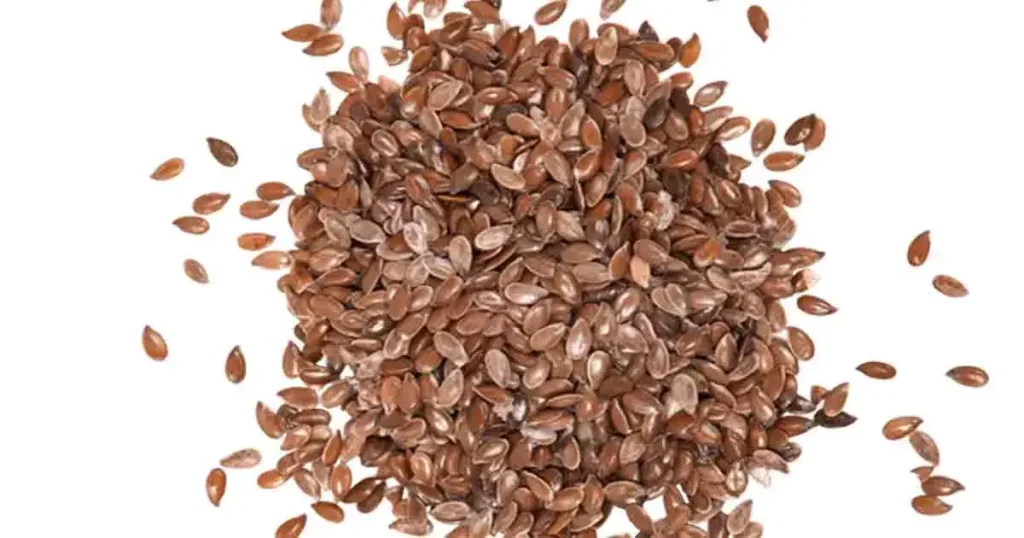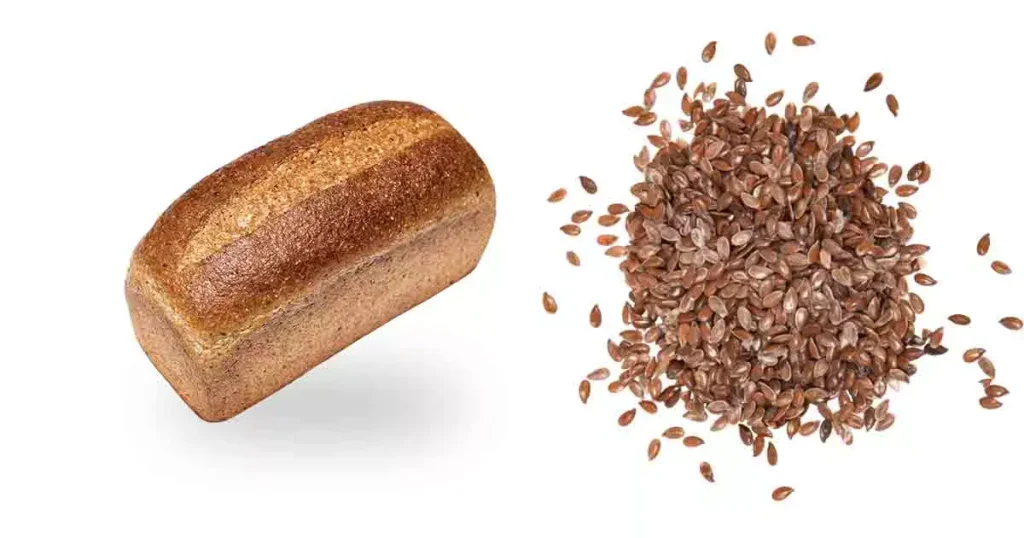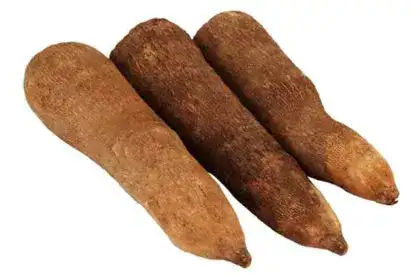The flowering plant flaxseed comes under the Linum genus and Linaceae family. This tiny seed can reduce significant risks like cancer, diabetes, heart disease, and even stroke also. The list of flaxseed health benefits is very long.
The agricultural uses and consumer demand for Flaxseed increases day by day. You can use both flaxseed and flax oil due to their non-toxicity. They are safe to consume. The fibre of the flax tree is used to prepare high-quality paper.

Flaxseed works as a magic bullet. The tempting health benefits of Flaxseed make it a superfood. This versatile seed has many potentials to cure and avoid various diseases and improve health conditions. It is an excellent dietary choice to enhance your lifestyle.
This article below contains almost all kinds of information about flax plants and flax seeds, like – flax seeds in Bengali, their cost, health benefits of flaxseeds, nutritional value, popularity, types, availability, etc.
| English name | Flaxseed |
| Bengali name | Sana Bija or Tishi |
| Binomial name | Linum usitatissimum |
| Kingdom | Plantae |
| Species | L. usitatissimum |
| Family | Linaceae |
| Order | Malpighiales |
| Genus | Linum |
Flax seeds in Bengali name
Sana Bija or Tishi is the Bengali name of Flaxseed. Sana Bija is a popular name in West Bengal and Assam. Indian people can understand the English name, but there is a possibility that the people in the rural areas of Bengali-telling areas are not aware of the word ‘flaxseed’.
So you have to use the typical Bengali name there. But in the town area, people can understand the English name and the restaurants there have many Flaxseed recipes.
Health benefits of Flax seeds
The vitamins, minerals, fibres, and omega – 3 fatty acids make Flaxseed a robust and healthy seed. This versatile seed has the potential to provide so many health benefits. It benefits cardiovascular diseases, lung disease, cancer, and many more.
1. Flaxseed helps fight against cancer
According to some studies, Flaxseed provides beneficial effects against colon, prostate, and breast cancer. Flaxseed has a high amount of omega – 3 fatty acids. According to animal studies, ALA or omega – 3 fatty acids help stop tumour growth and incidence.
The Lignan content of Flaxseed protects your body from cancer. Lignans are sensitive to hormones but don’t interfere with tamoxifen, a breast cancer drug. According to some studies, exposure to lignans during adolescence can help increase breast cancer patient survival and decrease breast cancer risk.
Flaxseed also has some antioxidant properties, which help to fight against heart diseases and cancer.
2. Flaxseed can help your body with the help of omega – 3 fatty acid
ALA, or alpha-linolenic acid, is one type of omega – 3 fatty acid. It is generally found in plant foods and helps to boost heart health. ALA is an excellent element present in Flaxseed. The human body can’t produce ALA, which is one of the fatty acids among the two essential fatty acids.
So you have to obtain ALA from your diet. Based on some animal studies, the alpha-linolenic acid present in Flaxseed helps prevent cholesterol deposition in the heart’s blood vessels and decreases inflammation levels.
According to a recent study, people who intake sufficient amounts of ALA regularly have a low chance of ischemic heart disease, stroke, and type -2 diabetes and have controlled cholesterol levels.
3. Flax seeds may help protect your body from chronic diseases
Because they contain beneficial fibre and fats and are high in polyphenols ( antioxidants that act as health protectors ). Polyphenols are the bodyguards of human body cells. They protect the body from cell damage which may lead to chronic diseases, ageing, cancer, and heart diseases.
4. Flaxseed helps to low down the cholesterol level
Another health benefit of Flaxseed is it helps to low down cholesterol levels. Based on a study of one month on patients suffering from peripheral artery disease, it is proven that consuming 30 grams or four tablespoons of milled Flaxseed daily can decrease the bad cholesterol level by 15%.
Based on a study on 112 people with high blood pressure for 12 weeks, it is proven that taking 30 grams of Flaxseed per day can significantly reduce total cholesterol level, BMI ( body mass index ), and blood pressure level. It can happen due to the fibre content in Flaxseed. Fibre helps to bind the salt in the body before its excretion by your body.
5. Flaxseed helps maintain your desired weight
Based on some studies, Flaxseed helps to manage weight. You can control the overall appetite and decrease hunger by consuming a flax fibre tablet with a soluble fibre of 2.5 grams.
Soluble fibre helps to increase the fullness feeling and slow down the digestion process. This process is beneficial for people who want to lose weight. According to more than 40 studies, it is seen that supplements of Flaxseed help significantly to reduce body mass index, belly fat, and body weight.
6. Flaxseed helps to protect your body from cardiovascular diseases
Omega – 3 fatty acids are helpful to the cardiovascular system. Flaxseed has anti-inflammatory effects, and it helps in heartbeat normalization. According to some studies, flaxseeds have significant blood pressure-lowering properties.
This procedure is possible due to the omega – 3 fatty acids and amino acid present in Flaxseed. Omega – 3 rich foods like flaxseed help to prevent artery hardening, and it doesn’t allow plaque to be deposited in the arteries. Omega – 3 fatty acids stop white blood cells to get stick at the inner linings of the blood vessels.
7. Flaxseeds help to fight against inflammation
Lignans and ALA are two main components present in Flaxseed which help to decrease the inflammation level. Inflammation may lead to specific health issues like asthma and Parkinson’s disease. Flaxseed helps to block specific pro-inflammatory agents’ release.
ALA helps to reduce inflammatory effects in the body. According to some animal studies, lignan help reduce some pro-inflammatory agents’ levels. As you know, Flaxseed helps to reduce the plaque buildup in the arteries; this process helps to prevent strokes and heart attacks.
Nutritional value of Flax seeds
The nutritional value you can get from flax seeds ( 100 grams ) –
| Nutrients | Quantity |
|---|---|
| Energy | 534 kcal |
| Protein | 18.29 grams |
| water | 7 grams |
| Fat | 42.16 grams |
| Polyunsaturated fat | 28.730 grams |
| Omega – 6 fatty acids | 5.9 grams |
| Omega – 3 fatty acids | 22.8 grams |
| Monounsaturated fat | 7.527 grams |
| Saturated fat | 3.663 grams |
| Carbohydrates | 28.88 grams |
| Dietary fibers | 27.3 grams |
| Sugars | 1.55 grams |
| Minerals | Values | % of the daily value |
|---|---|---|
| Zinc | 4.34 mg | 46% |
| Potassium | 813 mg | 17% |
| Phosphorus | 642 mg | 92% |
| Magnesium | 392 mg | 110% |
| Iron | 5.73 mg | 44% |
| Calcium | 255 mg | 26% |
| Vitamins | Quantity | % of DV |
|---|---|---|
| Vitamin B1 ( thiamine ) | 1.644 mg | 143% |
| Vitamin B2 ( riboflavin ) | 0.161 mg | 13% |
| Vitamin B3 ( niacin ) | 3.08 mg | 21% |
| Vitamin B5 ( pantothenic acid) | 0.985 mg | 20% |
| Vitamin B6 | 0.473 mg | 36% |
| Vitamin B9 ( folate ) | 87 micrograms | 22% |
| Vitamin C | 0.6 mg | 1% |
One hundred grams of Flax seeds have 7% water, 42% fat, 29% carbohydrates, and 18% protein. You can get 534 kcal of food energy from 100 grams of flax seeds. Flax seeds have high dietary fibre, minerals, proteins, and several vitamins. They are rich in thiamin, phosphorus, and magnesium.
All sorts of healthy components are present in Flaxseed. Some important are –
Nutrients
Flaxseed is famous as one of the ancient crops worldwide. Both the golden and brown Flaxseed provide almost the same nutritional content. You can get a good amount of vital minerals, fibres, omega-3 fatty acids, protein, and vitamins from just one serving of Flaxseed.
Seven grams or a single tablespoon of ground flaxseed contain a good amount of energy, fibre, fat, carbs, protein, thiamine, selenium, magnesium, manganese, phosphorus, zinc, iron, folate, copper, and vitamin B6.

Vitamin B1, or thiamine, is essential in cell functions and energy metabolism. Flaxseed contains a high amount of copper and thiamine. Copper helps in brain metabolism, health, immunity, and brain development.
Fibre content
Approximately 7 grams or one tablespoon of ground flaxseed contains 2 grams of fibre which is around 8% of the daily recommended intake for women and 5% of the daily recommended intake for men. Flax seeds have both insoluble and soluble fibres. The fibres get fermented in your intestine by the bacteria. It helps to improve bowel regularity and support gut health.
The insoluble fibre in Flaxseed helps add bulk to the stool, which promotes bowel movement regularly and reduces the problem of constipation. The soluble fibre content in Flaxseed helps slow digestion and absorb intestine water. This process helps to reduce cholesterol levels and regulate blood sugar.
Omega – 3 fatty acid content
ALA, or alpha-linolenic acid, is one type of omega – 3 fatty acid. It is generally found in plant foods and helps to boost heart health. ALA is an excellent element present in Flaxseed. The human body can’t produce ALA, which is one of the fatty acids among the two essential fatty acids.
So you have to obtain ALA from your diet. Based on some animal studies, the alpha-linolenic acid present in Flaxseed helps prevent cholesterol deposition in the heart’s blood vessels and decreases inflammation levels.
Lignans
These are the significant content of Flaxseed. They may protect your body from cancer. Lignans help to block those enzymes which help in the spread and growth of tumour cells and are involved in hormone metabolism.
Differences between brown Flaxseed and golden Flaxseed
| Brown flaxseed | Golden flaxseed |
|---|---|
| More robust flavor | Less robust flavor |
| Higher content of ALA | Less ALA compared to brown flaxseed |
| Bold flavor | slight and subtle nutty flavor |
| High content of total fat and omega -3 fatty acids | have less omega – 3 fatty acids and fat content |
| Easily available in many tores | Little difficult to find |
Cost of flax seeds in Bengali areas
The cost of Flaxseed in India differs according to the type ( whole, powder, brown flax, or golden flax ), packaging, brand, quality, and the buying place (online stores, local markets, or marts ). Rs 85 to Rs 320 per kg is the approximate cost of Flaxseed in India. Rs 90 to Rs 130 is the average cost of 1kg of Flaxseed in Kolkata. Rs 250 per kg is the approximate cost of Flaxseed in Assam.
The price is affordable because of Flaxseed’s easy and large availability in India. Flax is cultivated in more than 90% of places in India. Now a days it is easily available in online markets.
Popularity and availability of flax seeds in Bengali areas like West Bengal, Assam, Tripura
Flax is known as the very oldest cultivated crop. The natives of Flaxseed are from India to the region extending from the eastern Mediterranean. The central flaxseed cultivator states of India are – Assam, Nagaland, and West Bengal, Chattisgarh, Bihar, Odisha, Jharkhand, Madhya Pradesh, Maharashtra, and Uttar Pradesh.
India is one of the largest flaxseed producer countries worldwide. India never faces any flaxseed deficiency, even in high-demand situations. India exports Flaxseed to other countries to fulfil their need. It is also known as common flax and the best weather to cultivate flax is emperate climate.
Indians, including Bengali people, love to use Flaxseed or Sana Bija or Tishi in different dishes because of its easy availability ( West Bengal produces Flaxseed), low cost, and versatility.
Popular recipes of flax seeds in Bengali areas
This versatile seed can be used in smoothies, bakings, snacks, salads, oatmeal, breakfast bars, and granola. You should avoid cooking Flaxseed because it has a very low smoking point. Flaxseed has a nutty but mild flavour. It adds a crunchy and crisp element to any dish. Its use in any dish can enhance the texture and taste.

Some flaxseed recipes are – blueberry, banana, and flaxseed smoothie; Flaxseed and blueberry oatmeal; flaxseed idli Podi, chia, and flaxseed pudding; flaxseed raita, flaxseed chutney, flaxseed rice, flaxseed oatmeal pancake, flaxseed roti, crunchy flax seed crackers, flaxseed butter, flaxseed ladoo with jaggery, homemade flaxseed milk, flaxseed twisty sticks, flaxseed muffins, keto flaxseed bread, vanilla flaxseed cereal, etc.
Final verdict
Flaxseed works as a magic bullet. The tempting health benefits of Flaxseed make it a superfood. This versatile seed has many potentials to cure and avoid various diseases and improve health conditions. It is an excellent dietary choice to enhance your lifestyle.
This article contains almost all kinds of information about flax plants and flax seeds, like – flax seeds in Bengali, their cost, health benefits of flaxseeds, nutritional value of Flaxseed, popularity, types, availability, etc.
Frequently asked questions
1. What are the health benefits of flax seeds?
1. Flax seeds have a high amount of nutrients.
2. Flaxseed may help to ease arthritis symptoms.
3. Flax seeds may help to protect your body from chronic diseases.
4. Flaxseed helps to maintain your desired weight.
Flax seeds may help to stabilize the levels of blood sugar.
Flaxseed may help to reduce the level of blood pressure.
Flaxseed helps to low down the cholesterol level.
Flax seeds are very rich in fibre content.
Flax seeds help to fight against cancer.
Flaxseed has high omega – 3 fatty acid content.
Flaxseeds help to fight against inflammation
Flaxseed can help your body with the help of omega – 3 fatty acid
2. Give some tips for buying and using Flaxseed.
1. Try buying grounded Flaxseed or whole Flaxseed and grind it on your own.
2. Don’t confuse the name of milled, flax meal, and ground flaxseed. All are the same.
3. Choose golden or brown Flaxseed for better benefits.
4. Prefer to buy from offline stores by checking your presence. If not possible, then buy from reputable online stores.
5. Check product labels before buying.
6. Store flaxseed in the freezer for a long going.
7. It is easy to store the whole form of Flaxseed.
3. How does Flaxseed help to maintain your desired weight?
Based on some studies, Flaxseed helps to aid weight management. You can control the overall appetite and decrease hunger by consuming a flax fibre tablet with a soluble fibre of 2.5 grams.
Soluble fibre helps to increase the fullness feeling and slow down the digestion process. This process is very helpful for people who want to lose weight. According to more than 40 studies, it is seen that supplements of Flaxseed help significantly to reduce body mass index, belly fat, and body weight.
4. What are the popular flaxseed recipes?
Some flaxseed recipes are – blueberry, banana, and flaxseed smoothie; Flaxseed and blueberry oatmeal; flaxseed idli Podi, chia, and flaxseed pudding; flaxseed raita, flaxseed chutney, flaxseed rice, flaxseed oatmeal pancake, flaxseed roti, crunchy flax seed crackers, flaxseed butter, flaxseed ladoo with jaggery, homemade flaxseed milk, flaxseed twisty sticks, flaxseed muffins, keto flaxseed bread, vanilla flaxseed cereal, etc.
5. What are the different names of Flaxseed used in India?
Various names of flax seeds are used in India in different languages. Other flaxseed names are Aviselu in Telugu, Tisha in Bengali, Ali Vidai in Tamil, Agasi in Kannada, Cheruchana Vithu in Malayalam, Alsi in Punjabi, Hindi, Gujarat.
6. Which Indian states produce Flaxseed?
Flax is known as the very oldest cultivated crop. The natives of Flaxseed are from India to the region extending from the eastern Mediterranean. The major flaxseed cultivator states of India are – Assam, Nagaland, and West Bengal, Chattisgarh, Bihar, Odisha, Jharkhand, Madhya Pradesh, Maharashtra, Uttar Pradesh.

